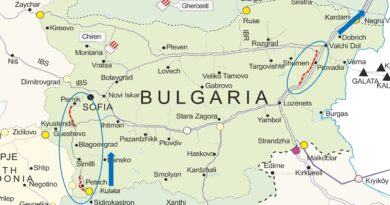Alternatives & Analyses: Bulgargaz’s ‘punta mara’ with the 50% reduction in the Russian gas price
It isn’t effortless to distinguish, which is the top ‘punta mara’ – the smoke and mirrors story of the day that the authorities have generated. Today there are at least two – Prosecutor General Geshev’s instructions to the Executive Agency for National Security to re-visit the privatization process and PM Borissov’s ‘radical’ backing of machine voting for the next elections, after a sequence of court orders that his Government complies with the law.
My favorite ‘punta mara’ is the one of yesterday, with the creative leaks in the Russian media, retelling a story in the Bulgarian press that the Bulgarian State gas trader ‘Bulgargaz’ is in the final lap of talks with Gazexport on an almost 50 percent price reduction. This news comes at the background of a proposed meager 2 percent reduction in gas prices to the regulator in the second quarter of 2020. At the proposed price level – they will remain double the spot price for natural gas at EU gas exchanges.
The critical word in the story is ‘might’ – Bulgargaz ‘might’ succeed in convincing, Gazprom ‘might’ agree.
Why is the leak for a 50 percent reduction a ‘punta mara’, a smoke and mirrors act?
The fact is that Bulgargaz and Gazexport are not negotiating a 50 percent reduction in the price, but a 50 percent share in the price formula for spot pricing, referenced to the Dutch TTF. The net effect of a new oil-index plus spot formula at today’s price will be a 25 percent lower price tag, not 50%.
Why then Kommersant Daily and other Russian media echo the Bulgargaz story?
These articles analyses and comments are made possible thanks to your empathy and contributions, which are the only guarantors of independence and objectivity in our work. The Alternatives and Analysis team.
The main reason is that the Bulgarian Gas Trader’s reluctance to sail in the winds of the EU-Gazprom Master Dispute Settlement Agreement and lower gas prices threatens the Russian gas monopoly with a sharper and more immediate drop in market share than otherwise anticipated. The sobering shot came as the heavily indebted largest customer of Bulgargaz – the Sofia District Company – started buying small volumes in slots of 1000 MWhr at the new gas exchange, forcing prices to sink by 18 percent in just two days. This sent a strong signal that competition is strong and that not everyone is ready to follow Bulgargaz-Gazprom’s lead. The CEO of the Sofia DHC, which accounts for 25 % share in the Bulgarian gas market, went further to assert that from next year onwards Bulgargaz will meet only 50% of its needs.
In forthcoming trading sessions at the Bulgarian Gas Exchange, prices are expected to sink further to levels around 35 leva/MWhr and below. This is well below the below 10 percent price reductions achieved in Bulgargaz’s direct purchase of gas from Kolmar and DEPA in previous deals, that left room for intermediaries to reap the benefit, instead of industrial and individual gas users.
Gazexport’s interests do not necessarily overlap with those of the middlemen, including Bulgargaz. The Kremlin is interested in market shares more than in short-term exorbitantly high prices that could encourage customers to flee Bulgargaz.
These last two days exemplify the range of new market freedom for traders and customers and the potential for market liberalization and competition in Bulgaria.
The excellent news for local customers is that prices will fall not only in the ‘day-ahead’ trading but for weekly, monthly, and annual products. Liquidity is no more a problem for longer-term trading as more traders will note the shifts in the Bulgarian Gas Exchange.
The conclusion is that ‘punta maras’ of Bulgargaz might be useful for a while, but the market will outsmart every market autocrat.
Ilian Vassilev
Thank you for your donnations via PayPal and bank transfers to IBAN BG58UBBS80021090022940
the Alternatives and Analyses NGO.




